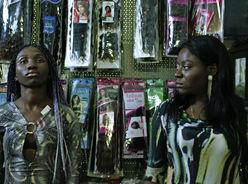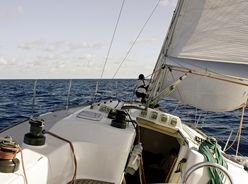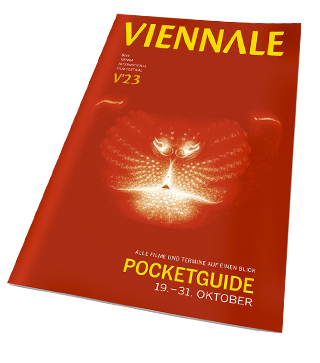VIENNA FILM PRIZE
Jury: Bettina Kogler, Mira Lu Kovacs, Corinna Milborn, Doris Uhlich, Renate Wurm
The Vienna Film Prize, donated by the City of Vienna and awarded at the Viennale, goes to a current Austrian feature film that has been screened during the past year. The prize consists of a sum of money, donated by the city’s cultural department, and generous material assets, sponsored by BLAUTÖNE and viennaFX. There are two awards: one for the best Austrian film and the Special Jury Prize. Owing to the generosity and commitment of all involved, the Vienna Film Prize continues to represent encouragement and recognition of the work of Austrian filmmakers.
Best Austrian Film

Sudabeh Mortezai, Austria 2018
Excerpt from the jury’s decision:
In a direct and unembellished way, the Viennese director Sudabeh Mortezai tells the story of Joy, a Nigerian who fights for survival in Vienna as a prostitute, caught in the system of trafficking in women and sexual exploitation. The director exposes the mechanisms and brutality of this system, using amateur actresses whose great performances create an authenticity and intensity that gets under the skin. The jury was particularly impressed by how Sudabeh Mortezai turned this reality into a film. (...) The almost unbelievable story, the impressive acting, the improvised dialogs and, finally, the camera work, which involves the viewer directly, convinced the jury unanimously. The Vienna Film Prize thus goes to JOY.
Special Jury Prize

Christian Frosch, Austria/Luxembourg 2017
Excerpt from the jury’s decision:
The Special Jury Prize goes to MURER – ANATOMIE EINES PROZESSES (“Murer – Anatomy of a Trial”) by Christian Frosch. This feature film chronicles the court case against the Austrian NSDAP functionary Franz Murer, also known as the “Butcher of Vilnius” due to the extermination of almost 80,000 Jews. The trial was held in Graz, Austria, in the 1960s and ended with an acquittal. In an extremely impressive way, MURER – ANATOMIE EINES PROZESSES portrays the unresolved issue of Austrian National Socialism of the post-war period, which – it can’t be put any other way – continues to this day. The jury therefore regards the film as an important contemporary document that has an enlightening effect. The court film juxtaposes the impertinence, cold-bloodedness and ignorance of the perpetrators to the pain and renewed humiliation of the victims in an extremely precise and touching way.
VIENNALE STANDARD READERS’ JURY PRIZE
Jury: Katharina Ganser, Maria Macic, Patrick Mittler, Marietta Trendl, Hans-Peter Tscheru
The Standard Readers’ Jury Prize goes to a film that does not yet have an Austrian distributor and is especially recommended for screening in Austrian cinemas. Should the award-winning film find a distributor, Der Standard supports its film run with free advertising space in its newspaper.
The STANDARD READERS’ JURY PRIZE goes to:

Roberto Minervini, Italy/USA/France 2018
Excerpt from the jury’s decision:
We have chosen a film that covers the screen with stunning black-and-white visual aesthetics and is characterized by the precision of photographic shots. With these aesthetics, the director creates a cross-generational documentary about justice, dignity and the fight against racism that leaves a lasting impression. His reserved and respectful way of working produces an intimate authenticity and liveliness that is both moving and fascinating. The film reveals, without lecturing. It is an important and valuable contribution to the public discourse about the structural discrimination of Afro-Americans in the USA.
FIPRESCI PRIZE (PRIZE OF THE INTERNATIONAL FEDERATION OF FILM CRITICS)
Jury: Andrey Arnold (Die Presse), Heidi Strobel (Film-Dienst), Yeşim Tabak (Arka Pencere)
The FIPRESCI PRIZE is awarded to the first or second film of a young director.
The FIPRESCI Prize goes to:

César Vassyié, France 2018
Excerpt from the jury’s decision:
Sensation, sexuality, confusion. Performance, insistence, resistance ... Escalation and distraction. Detachment... or commitment? These are only some of the notions throbbing throughout our winning film. They let us reflect on the creative potential of 1968 and its echoes today. This film is a hypnotic collage, a vibrant composition, a powerful drum roll that leads us into a moment of silence ... The FIPRESCI jury decided to award the FIPRESCI Prize to NE TRAVAILLE PAS by César Vayssié.
ERSTE BANK’S ExtraVALUE FILM AWARD
Jury: Silvia Bohrn, Franz Schwartz, Boris Manner
Erste Bank’s ExtraVALUE Film Award was awarded for the eighth time at the Viennale 2018. An independent jury selected an award winner from films by Austrian directors shown at the festival. The prize includes a two-month residency in New York and a presentation of the winner’s work in that city. Erste Bank’s ExtraVALUE Film Award is realized in collaboration with the Viennale, the Deutsches Haus at NYU, the Austrian Cultural Forum New York and Anthology Film Archives.
This year’s ExtraVALUE Film Award goes ex aequo to:

Sara Fattahi, Austria/Syria/Lebanon/Qatar 2018

Wolfgang Fischer, Germany/Austria 2018
Excerpt from the jury’s decision:
Erste Bank’s ExtraVALUE Film Award 2018 goes to Sara Fattahi for CHAOS.
Three women, stranded in different places, try to put into words the deadly losses and traumas they suffered during the war in Syria. In atmospheric and, in part, dream-like images, the film follows the rhythm of the protagonists’ futile attempts to put into words the unspeakable, the death of a loved one. CHAOS is a meditation on silence and quiescence. A question about the place of female speech. A film that addresses the possibility and impossibility of memory. A film that reflects its own limits of representation and transcends them by assuming the notion of a poem.
Erste Bank’s ExtraVALUE Film Award 2018 goes to Wolfgang Fischer for STYX:
The journey of the German doctor Rike, who embarks on a solo sailing trip from Gibraltar, becomes an existential challenge to her. A cinematic event reminiscent of an experimental arrangement to explore the human capacity for empathy, and yet painfully outdone by reality. Caught between maritime law and official orders, a woman makes a final decision, risking her existence.

